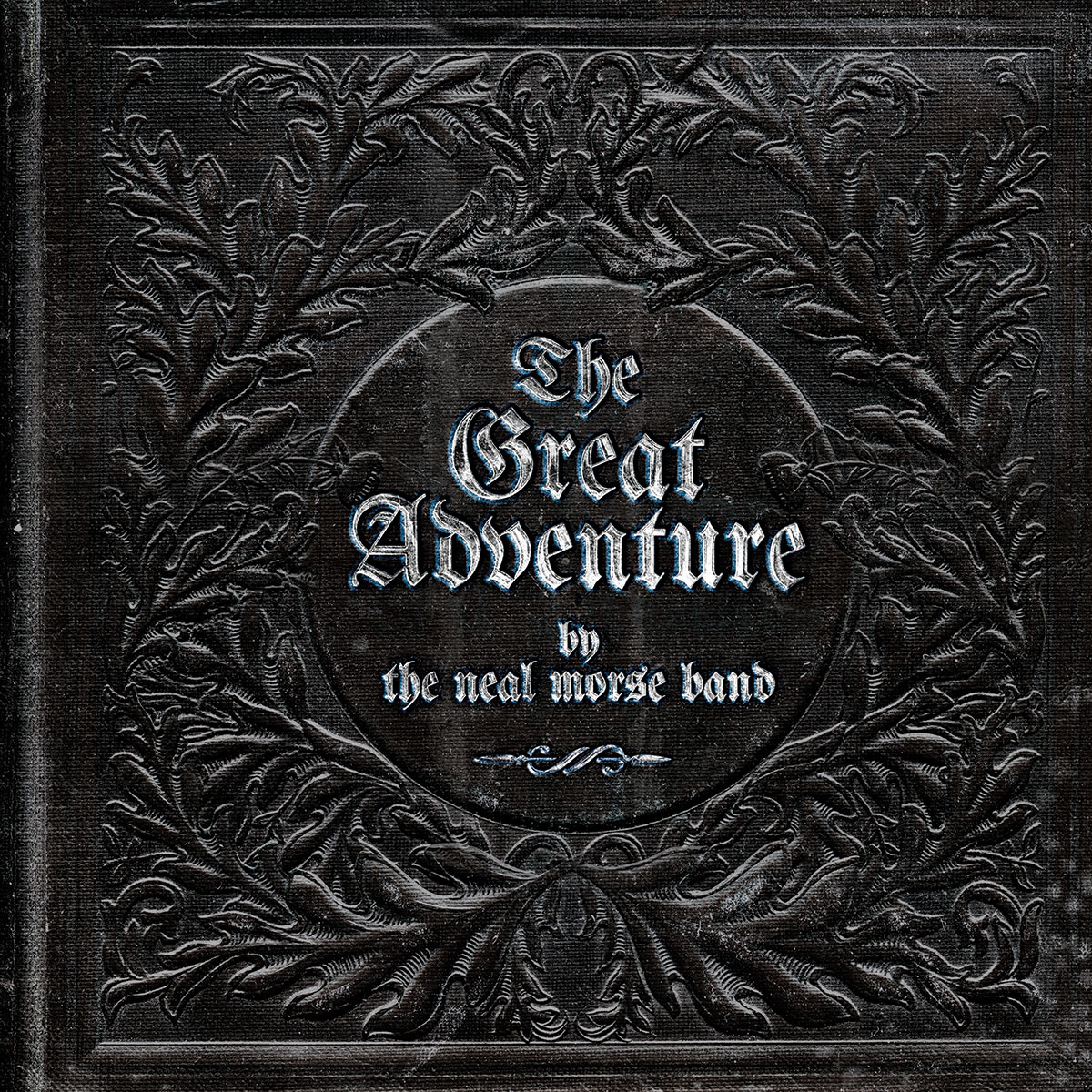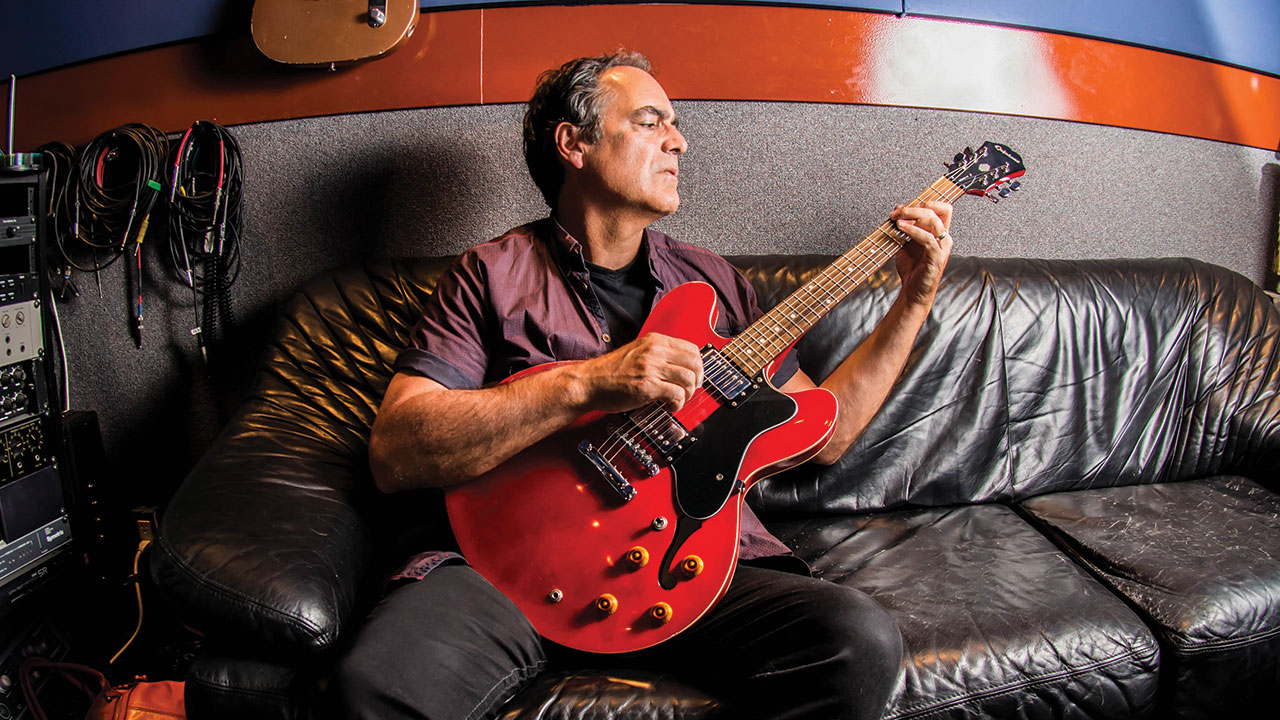
Stephen Hawking’s A Brief History Of Time is a book that many own but few have managed to read cover to cover. The Pilgrim’s Progress by John Bunyan is another. But it’s this 300-plus-year-old Christian allegory which has served as the inspiration for both The Neal Morse Band’s last album, 2016’s The Similitude Of A Dream, and this year’s The Great Adventure. And Morse has now actually finished reading The Pilgrim’s Progress to boot.
Back in 2016, Morse embarked upon recording The Similitude Of A Dream with some reservations, both about the subject material and its form, namely, the fact that it was a double album. His long-time foil, former Dream Theater drummer Mike Portnoy, was also nervous about comparisons being made with his old band, given Similitude…’s release was shortly after the emergence of Dream Theater’s The Astonishing double album. Now, however, both feel that making Similitude… really paid off.
“Similitude… really was a landmark album for us,” Morse reflects from his Tennessee home. “Making an album is a whirlwind. I usually have to wait for the dust to settle beforeI realise the quality of what we’ve done. Butat the end of the Similitude… recording sessions, Mike said he thought we’d made the album of our careers. And that may be true. Art is so subjective, but Similitude… is one of the best albums I’ve ever been involved in.”
That’s a striking statement given Morse’s career over the last 25-odd years since Spock’s Beard burst onto a somnolent progressive rock scene with their debut album, The Light. He subsequently led Spock’s for a further five albums (of which he rates 2000’s V most highly) before forsaking his own band in favour of pursuing a solo career and playing in prog supergroups Transatlantic and Flying Colors.
Following the enthusiastic reception afforded The Similitude Of A Dream, the challenge for Morse and his cohorts was how to match – or indeed top – that album. Morse’s original intention was to create an album that was markedly different from the end product that The Great Adventure represents. “Every album is different, but this one was a strange process,” he muses.

Morse initially had some ideas during breaks from the lengthy Similitude tour that related to The Pilgrim’s Progress concept, including the song Vanity Fair, which appears on The Great Adventure. He was, however, both resistant to those ideas and not overburdened with others. “Nothing else much came. And I could already feel from talking on tour with the guys that doing another concept album, let alone another concept album based on the same idea, was not what the band wanted to do next.”
With Morse’s muse temporarily failing to deliver further inspiration, he felt that there was more of the Pilgrim’s Progress story to tell, but didn’t have sufficient pieces in the puzzle to make a convincing overall picture. Gathering in Tennessee in August 2017, the band started working on demos without Portnoy, before convening in January last year with their drummer for what transpired, by the standards of The Neal Morse Band, to be an atypically lengthy writing and recording session: a fortnight.
Initially The Great Adventure was shaping up to be a single album. “But I just didn’t feel it was quite there,” Morse continues. “It had the Love That Never Dies theme woven in and out of it. But as I listened to it, it really sounded like a concept album. There were lots of interwoven themes. But nobody, including me, really wanted to do a double album. It would have been so much easier to have left it as the single disc original version. But it just didn’t seem to me that it was everything it wanted to be and I couldn’t let it go.”
Morse then alighted on the pilgrim’s abandoned son as a focus, which unlocked the album for him lyrically. While theoretically taking a break from his solo Life & Times tour in March and April last year, he wrote and demoed a two-and-a-half-hour-long version of the album. The band then reconvened in August to finalise the album, which put Morse under considerable pressure, with his annual Morsefest extravaganza to prepare for the following month as well as The Great Adventure’s release date this month.
“We were cutting it super-close. It was daring for us to commit to having the album ready to release in January and debut it on Cruise To The Edge in February. It was a leap of faith, but it’s all worked out. It’s a miracle of God that this album came together and that it’s as good as it is.”
At around 110,000 words long, Morse made only limited inroads with Similitude… into The Pilgrim’s Progress. Focusing on the abandoned son, The Great Adventure is not a sequel in the strictest sense, but rather uses The Pilgrim’s Progress as a launch pad. “I apologise to fans of the book,” Morse laughs. “The Great Adventure is all over the place: it’s very loosely based on the book. There’s hardly any talk in it of the abandoned son. I was only marginally inspired by the book and there’s a lot that really has very little to do with the book.”
Morse suspects he has now exhausted The Pilgrim’s Progress for musical purposes. “I don’t know if there’s much more in there that I feel inspired about. Also, the book is rather heavy on judgment, so I changed a lot of that both on this album and Similitude…. The Man In The Iron Cage in the book is left without hope – I had to give him hope and tried to make it a little more gracious.”
While being one of the prog scene’s most prolific musicians with almost 40 studio albums to his name since The Light, Morse doesn’t ever worry that the wellspring of inspiration will run dry. “I don’t fear not being able to write any more,” he explains. “It’s really up to God whatever he wants to give me – I acknowledge him as the source of all these things and that gives me peace. I’m just thankful beyond belief that I can provide for my family doing music that I love – what a blessing.”
He is, however, conscious of the danger of repeating himself. “I don’t like to repeat myself or rip anything else off, but sometimes we don’t notice,” he admits. “I try to surround myself with people that will bust me, because I don’t really listen to my own music that much after I create it. After one of my worship albums [Morse engineer] Jerry Guidroz texted me and said, ‘Nice rip from another album,’ and I listened to the verses and they were exactly the same. I was completely oblivious! It’s good to have people around you who can catch you on that stuff.”

The Great Adventure is the third studio album being released under The Neal Morse Band banner rather than as plain old Neal Morse. Morse feels it’s an important distinction. “It’s become a real band. The contributions of the guys are so important.” Indeed it transpires that, following the release of 2015’s The Grand Experiment album, consideration was given to adopting a new band name unrelated to ‘Morse’. “But The Grand Experiment had done pretty well and we felt for retailers that the name recognition would help, so we stuck with the name. Now it’s too late to call it something else. What’s in a name? Who cares! It sounds corny, but it’s all about the music.”
The Neal Morse Band’s line-up – rounded out by guitarist Eric Gillette, keyboardist Bill Hubauer and Morse’s long-time bassist Randy George – has also proved unusually durable. “Everyone is great to work with and pretty mellow – except Mike! We all temper and complement each other well. The sharpest disagreements have all been about creative decisions. None of those things get nasty and everyone is entitled to their opinions.”
Being branded The Neal Morse Band may lead to the perception that the shots ultimately are called by Morse personally. But the man himself advocates stridently to the contrary. “It’s really not that way,” he insists. “We all pick our battles: the things we feel really strongly about. There are many moments on this record where everybody lost something that they really liked, but someone else felt strongly about something else. After the basic tracking we go off into our ‘laboratories’ and start laying stuff down.”
That modus operandi brings with it dangers of musical duplication or clashes “where it can be too much to have it all”. Resolving these clashes falls frequently to mixer Rich Mouser, a longstanding Morse associate, to make the choices and thin parts out.
Morse’s argument that he isn’t always the band’s centre of gravity is significantly substantiated by the stunning, uplifting album closer A Love That Never Dies, where his own vocal cedes early on to Gillette. “Eric’s vocal on that is great,” he enthuses. “When we originally took Bill and Eric on as sidemen for touring, I knew that they could sing well. But the way the voices are working and blending on these parts, only the Lord can orchestrate. One of the reasons why these albums are off the chart is like Eric’s vocal at the end of the album, which just takes it to a place that I never could never take it. My range tops out at about an F sharp – I do the highest notes that I can do, but there’s something at the next level that Eric has.”
Following the success of the Similitude tour, where that album was performed in full each night, the band plan to play The Great Adventure in its 105-minute entirety each show on their forthcoming dates, with the encore as the only variant. “Similitude… delivered every night live when we last toured. All we had to do was get out there and play the piece with all our hearts. People were crying – it was just beautiful. I don’t want to go out after tasting that and do a tour where that isn’t really delivering.
“I used to think that we had to put on a show, but we didn’t,” he continues. “The older I’ve got, I realise it’s the material. I go to a lot of classical concerts and it’s mainly about the piece of music. World Without End [from Morse’s 2012 album Momentum] is a great piece, but somehow it didn’t quite deliver as the closer of the night, so we needed to come back out and do [Morse solo track] Author Of Confusion or the end of [Transatlantic’s] Stranger In Your Soul.”
Morse is primed for a very active 2019. Aside from touring with The Neal Morse Band, he’s also gearing up for the release before the summer of his musical Jesus Christ The Exorcist. Work also continues on a third Flying Colors album for a potential late summer or autumn release. And while there are no concrete plans yet for a further Transatlantic album, Morse is optimistic about the prospect. “I would like to do another Transatlantic album,” he says unequivocally. “But it depends what the other guys feel and when it fits. There are a lot of other worlds to revolve around. The stars have to align with Mike [Portnoy], Pete Trewavas and Roine Stolt.”
In any event, Morse is working more intensely than he had expected or planned
at the age of 58. “I thought I would probably start winding down four years ago,” he reflects, “but I try to let God lead my life. My wife is always asking when we’re going to do less. But creatively we keep moving forward and climbing higher.” For the foreseeable future, Mrs Morse’s hopes of them winding down may prove forlorn.







